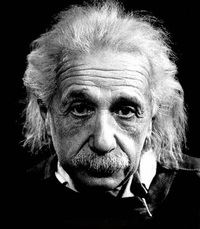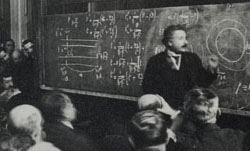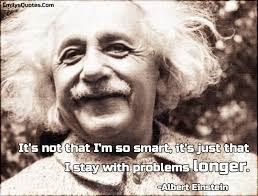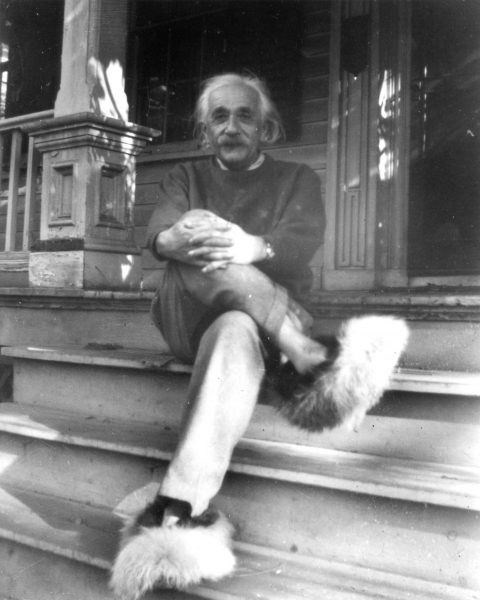 Albert Einstein, the famous physicisthttps://www.goodreads.com/author/show/9810.Albert_Einstein"There are no heroes anymore. We can't find them. We certainly can't look for them in any of the places where we used to find them." (Granger, 1). While this may be true for the modern era, perhaps we can look up to heroes that lived in other times, when more heroes were prevalent. One of the most preeminent heroes then was Albert Einstein, who was a brilliant physicist and mathematician. What made him, or anyone we consider a hero a hero? We can find them in the top positions of a field, or in places where lives are risked, and where advancements are made. We can find them in stressful situations, or in places where skull-cracking problems have been solved. Even if only one person’s life is changed a single time, that action by that hero made a difference. In any situation, a hero must be tenacious, determined, and innovative, able to persevere through hardship, never give up, and creatively solve difficult situations. From all aspects, Albert Einstein is a perfect fit for these traits, displaying them regularly throughout his life.
Albert Einstein, the famous physicisthttps://www.goodreads.com/author/show/9810.Albert_Einstein"There are no heroes anymore. We can't find them. We certainly can't look for them in any of the places where we used to find them." (Granger, 1). While this may be true for the modern era, perhaps we can look up to heroes that lived in other times, when more heroes were prevalent. One of the most preeminent heroes then was Albert Einstein, who was a brilliant physicist and mathematician. What made him, or anyone we consider a hero a hero? We can find them in the top positions of a field, or in places where lives are risked, and where advancements are made. We can find them in stressful situations, or in places where skull-cracking problems have been solved. Even if only one person’s life is changed a single time, that action by that hero made a difference. In any situation, a hero must be tenacious, determined, and innovative, able to persevere through hardship, never give up, and creatively solve difficult situations. From all aspects, Albert Einstein is a perfect fit for these traits, displaying them regularly throughout his life.
Albert Einstein was a German physicist and mathematician, born in Ulm, Germany, on 14 March 1879, the only son of Hermann and Pauline Koch Einstein, a Jewish couple. He was a child prodigy in mathematics. His talent in math allowed him to study physics, which he soon fell in love with, so much so that at 11 he began to study physics at the university level. However, the strict regiment of the German school system was unbearable for Einstein. When he was sixteen he left Germany to avoid the drafting for the army, and moved to Switzerland. Einstein went to enroll at a university in Switzerland, but he failed to get in on his first try. However, after a year of study, he passed the entrance exam for the Zurich Polytechnic Institute. After trying and failing to find a teaching position in Switzerland, he found a position with the Swiss Patent Office reviewing patent applications. While there, he wrote papers that would revolutionize the study of physics, building what would come to be known as “the golden year” of his physics career. One of these papers came from a thought experiment about light that he had thought up when he was 16. This paper is now famously known as the Special Theory of Relativity. It introduced revolutionary thoughts about motion and flipped physics on its head. Einstein had his famous equation, E=mc2, in this theory as mathematical support. As a result of his publications, he became famous in the physics community. In response to this fame, Einstein was invited to Berlin where he got a job at the University of Berlin. He was finally free to do research on theoretical physics. About a year later, Einstein published his famous General Theory of Relativity, which resolved some of the problems with special relativity. In November 1921, he was awarded the Nobel Prize for Physics. His theory of relativity, however, was still controversial. To some anti-sematic physicists, he was just a crazy Jew. Einstein later spent much of his time at the United States' Caltech University. In the same year that Hitler came to power, Einstein took a permanent job at Princeton, and he became a US citizen. Einstein spent the rest of his life, even after retirement, working to combine all forces into his Theory of Everything. He became even more famous in the physics world for showing in his work that which he loved the most, a mathematical expression of physics. On April 18, 1955, Albert Einstein, one of the greatest physicists of all time, died. Even after many years, the theories created by this brilliant mind have been scrutinized and explored by physicists. Many so-called heroes have left legacies in their wake, however, to be a true hero, one must have tenacity, determination, and an innovative mind, and Einstein had these in spades. Albert Einstein not only made a multitude of contributions toward science and understanding, but also improved our society through his innovation, tenacity, and his ability to inspire today’s generation to work harder, making him the one of the most iconic heroes of our time.
 Albert Einstein teaching his studentshttps://www.amnh.org/learn/pd/physical_science/profiles/aeinstein_2.html
Albert Einstein teaching his studentshttps://www.amnh.org/learn/pd/physical_science/profiles/aeinstein_2.html
Many believe that Einstein was a genius who created many new theories, however, while he did make new theories, his true strength lay in establishing and correcting the mistakes that other prestigious scientists made in creative and radical ways, making him one of the most innovative physicists of the modern era. This is illustrated by one of his first and most famous theories: “While Newton's theories were excellent for describing the motions of bodies on Earth or in space accurately in the late 17th Century, closer inspection of the motion of stellar bodies reveals shortcomings. Einstein in his general theory of relativity was the first to successfully improve on Newton in 1905.” (Times, 1). Newton created his theory that all things with mass attract each other through a force called gravity. This theory holds up under almost any circumstance, but on a cosmic or subatomic level, this theory falls apart. This problem had stumped physicists for two centuries, however no one had been able to find a solution. No one, that is, until 16 year old Einstein found it. As a physicist, Newton covered his bases pretty well, however Einstein’s ever innovative mind, the most long standing theory of all time fell apart, and gave rise to Special Relativity. Einstein was showered with praise, and no one could find anything wrong with his theory… except for Einstein himself. His own innovative personality wouldn’t allow him to leave anything untouched: “Special relativity is mathematically self-consistent. It has no inconsistencies, although it is only valid outside of gravitational fields. Inside the effects of gravity with a potential greater than c^2, you need to use General Relativity.” (Gardiner, 1). As Einstein recognized the shortcomings of the special theory of relativity, he created general relativity, which is a theory that covers all situations in which special relativity doesn’t work. Even with his own work, Einstein was relentlessly scrutinizing, and was never afraid to improve on it, and by doing this he displayed tremendous innovation.
 A persevering quote from Einsteinhttps://emilysquotes.com/its-not-that-im-so-smart-its-just-that-i-stay-with-problems-longer/
A persevering quote from Einsteinhttps://emilysquotes.com/its-not-that-im-so-smart-its-just-that-i-stay-with-problems-longer/
While his innovative mind helped Einstein tremendously, there is no way it was the only trait he had that allowed him to solve difficult problems. Many believe that Einstein’s theories were thought up and proved within days at the most, and they would be completely wrong, as some theories took decades for him to finish, illustrating his tenacity. This is illustrated by his work after his retirement: “Even after his retirement, Einstein worked to the end of his life on a so-called ‘Theory of everything’” (Times, 1). Einstein retired 30 years before his death, yet he still worked on theories for decades. Even with his accomplishments and fame, he did not stop and sought to continue contributing to the physics world. Einstein’s tenacity is prominently displayed through even his first theories, such as the theory of relativity: “Relativity took him 22 years to complete, and must have been extremely complex, as it took a few years for the other physicists to make sense of it.” (Gardiner, 1). Even as a teenager, Einstein had the perseverance to stay with a difficult problem for decades on end. Now, a teenager will give up after 10 minutes trying a difficult math problem, let alone 20 years. This just goes to show how persevering and tenacious Einstein was.
 Einstein after retirement at Princetonhttps://princetonhistory.org/research/historic-princeton/albert-einstein/From any point of view, Einstein embodied the modern definition of a hero, as someone with a never ending innovative mind, and with tremendous tenacity, inspiring people for generations on end. His innovative personality allowed him to creatively solve and scrutinize difficult problems that stump others, and made him able to see things from different perspectives. His tenacity enabled his ability to continuously work for decades without stopping, and allowed him to unendingly make enormous contributions to the scientific society, overturning all notions of his theories being wrong. For years his work has inspired me, and has since led to my interest in math and science, and helped me find my favorite subject and possibly career, biochemistry. The hardships he had to overcome sparked with me a determination to continue trying, no matter how hard the problem becomes. Although we may not be able to find heroes to look up to today, the past holds many worthy heroes. One just has to look hard enough.
Einstein after retirement at Princetonhttps://princetonhistory.org/research/historic-princeton/albert-einstein/From any point of view, Einstein embodied the modern definition of a hero, as someone with a never ending innovative mind, and with tremendous tenacity, inspiring people for generations on end. His innovative personality allowed him to creatively solve and scrutinize difficult problems that stump others, and made him able to see things from different perspectives. His tenacity enabled his ability to continuously work for decades without stopping, and allowed him to unendingly make enormous contributions to the scientific society, overturning all notions of his theories being wrong. For years his work has inspired me, and has since led to my interest in math and science, and helped me find my favorite subject and possibly career, biochemistry. The hardships he had to overcome sparked with me a determination to continue trying, no matter how hard the problem becomes. Although we may not be able to find heroes to look up to today, the past holds many worthy heroes. One just has to look hard enough.
Works Cited
Isaacson, Walter. Einstein: his life and universe. Thorndike Press, 2007.
"Albert Einstein." American Decades, edited by Judith S. Baughman, et al., Gale, 1998. Biography in Context, https://link.galegroup.com/apps/doc/K1602000416/BIC1?u=powa9245&xid=e6dbc469. Accessed 8 Jan. 2018.
“Albert Einstein - Biographical.” Nobelprize.org, www.nobelprize.org/nobel_prizes/physics/laureates/1921/einstein-bio.html.
“Albert Einstein.” Biography.com, A&E Networks Television, 20 Dec. 2017, www.biography.com/people/albert-einstein-9285408.
FilmArchivesNYC. YouTube, YouTube, 11 Mar. 2013, www.youtube.com/watch?v=OamFZCFfQkg.
“Simple theory says Newton is wrong, Einstein can be improved and dark matter does not exist.” Times Higher Education (THE), 22 May 2015, www.timeshighereducation.com/news/simple-theory-says-newton-is-wrong-einstein-can-be-improved-and-dark-matter-does-not-exist/201449.article.
“What are the flaws and inconsistencies with the theory of relativity?” Quora, 17 Nov. 2013
https://www.quora.com/What-are-the-flaws-and-inconsistencies-in-the-theory-of-relativity
Page created on 2/15/2018 7:28:02 PM
Last edited 2/26/2018 3:23:31 AM
